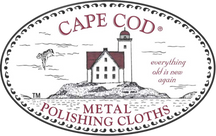Should Brass be Laquered?
Feb 10, 2014
There are two questions we are frequently asked at Cape Cod Polish regarding brass:
1. Should I lacquer my brass to protect it?
2. How do I get lacquer off brass?
These two questions are very telling. Just like any protective coating, lacquer doesn't last forever, and it doesn't wear off evenly.
In areas like Cape Cod, lacquer finishes get quite a beating from salt air spray and the elements. After a while, small holes (called pits) begin to form. High humidity and air pollution also harm laquer. Lacquer can also be worn off or scratched up if it is touched frequently (on a brass door knob or on a brass kick plate, for example.)
What happens when pitting or scratching occurs? These tiny holes and scratches in the lacquer allow air to come into contact with the actual brass surface. From these tiny areas of contact, tarnish can spread under the surface of the lacquer. This tarnish bloom can spread over huge areas of a brass object. The worst part is you can't polish it off, because it's under the lacquer. In this case the only thing to do is to remove the lacquer.
How to remove lacquer.
To summarize our on-line brochure "Caring for your Fine Metals": "...lacquer can be removed with acetone or amyl acetate (banana oil). Coated objects can also be stripped with a solution of baking soda and boiling water (1 cup soda to 2 gallons boiling water). Let the article stand in the water until it cools and peel off the lacquer." Keep in mind this is not an easy job.
After the lacquer is removed then you can polish the brass.
So, if you are planning to lacquer an outdoor or frequently used object, you probably will do better just polishing it with Cape Cod Polishing Cloths. Just make a point of giving it a once over every so often to make sure it's not starting to tarnish. And if it's a rarely touched, indoor object? Then just polish it with Cape Cod Polishing Cloths. Our cloths leave a protective coating to lengthen the time between polishing.
One of our favorite brass companies is Jefferson Brass out of McLean, VA: www.jeffersonbrass.com. They have a beautiful line of brass door knockers, brass candlesticks, and fireplace tools and they never lacquer their pieces.
1. Should I lacquer my brass to protect it?
2. How do I get lacquer off brass?
These two questions are very telling. Just like any protective coating, lacquer doesn't last forever, and it doesn't wear off evenly.
In areas like Cape Cod, lacquer finishes get quite a beating from salt air spray and the elements. After a while, small holes (called pits) begin to form. High humidity and air pollution also harm laquer. Lacquer can also be worn off or scratched up if it is touched frequently (on a brass door knob or on a brass kick plate, for example.)
What happens when pitting or scratching occurs? These tiny holes and scratches in the lacquer allow air to come into contact with the actual brass surface. From these tiny areas of contact, tarnish can spread under the surface of the lacquer. This tarnish bloom can spread over huge areas of a brass object. The worst part is you can't polish it off, because it's under the lacquer. In this case the only thing to do is to remove the lacquer.
How to remove lacquer.
To summarize our on-line brochure "Caring for your Fine Metals": "...lacquer can be removed with acetone or amyl acetate (banana oil). Coated objects can also be stripped with a solution of baking soda and boiling water (1 cup soda to 2 gallons boiling water). Let the article stand in the water until it cools and peel off the lacquer." Keep in mind this is not an easy job.
After the lacquer is removed then you can polish the brass.
So, if you are planning to lacquer an outdoor or frequently used object, you probably will do better just polishing it with Cape Cod Polishing Cloths. Just make a point of giving it a once over every so often to make sure it's not starting to tarnish. And if it's a rarely touched, indoor object? Then just polish it with Cape Cod Polishing Cloths. Our cloths leave a protective coating to lengthen the time between polishing.
One of our favorite brass companies is Jefferson Brass out of McLean, VA: www.jeffersonbrass.com. They have a beautiful line of brass door knockers, brass candlesticks, and fireplace tools and they never lacquer their pieces.

4 comments
Thank you so much for this information. I am currently planning to “de-lacquer” several pieces and was wondering how to do it. I am also looking for brass locks, etc. Since Virginia Metalcrafters is no longer in operation, I was thinking the best I could do would be to find one from a source that sells objects from the former Craft House catalogue from the Colonial Williamsburg Foundation. I found this newsletter particula